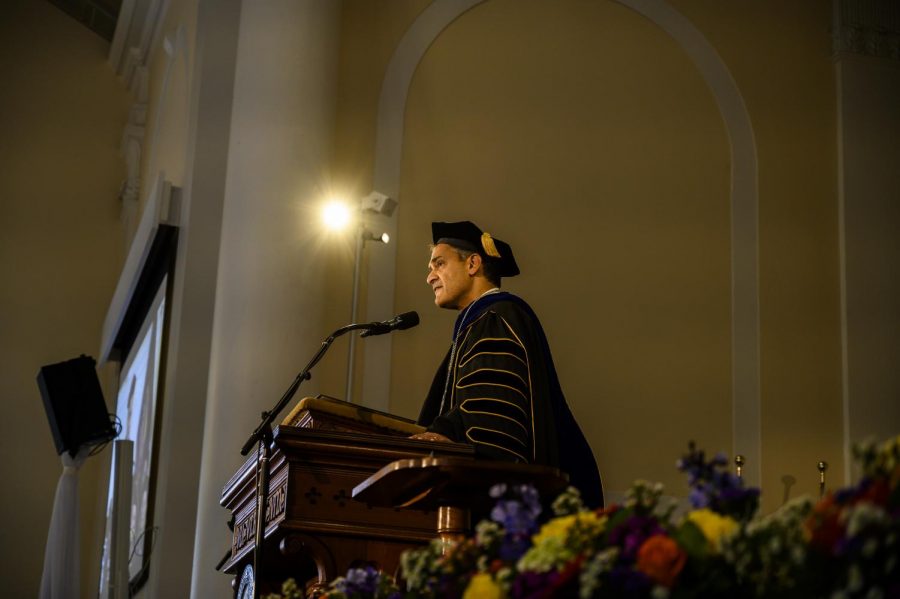UVM president warns community of likely layoffs and pay cuts
President Suresh Garimella is presented with the University mace at his Installation Ceremony, Oct. 4. During his address, Garimella said he is committed to bettering both UVM and Vermont.
As UVM’s financial wellbeing teeters, President Suresh Garimella warned the community that tactics such as salary reductions and layoffs might take place going forward.
In a memo sent to the community May 11, Garimella outlined the current financial challenges facing UVM and some steps the university may have to make going forward to combat these challenges.
“We will need to make difficult decisions at all levels to ensure that the university thrives through this process and that students are getting the best education possible,” Garimella said at an interview May 11.
The University has already implemented faculty travel bans, a hiring freeze and academic and administrative budget cuts to combat financial drawbacks.
“Most of the administrative ranks have taken a pay cut, and yet many of us are working well over 100% of our time, but that’s what is called for,” Garimella said.
Garimella said that it is too early to tell whether or not there will be layoffs.
The email stated that there will likely be staffing, salary and benefits implications.
“We will be examining such options in the weeks ahead, respectful, of course, of any agreed-upon contractual or union obligations,” the email stated.
COVID-19 has caused uncertainties in class size and student enrollment for the 2020-21 school year across the country, which has added more pressure to the preexisting challenges facing higher education.
Reviewing the data based on current numbers of high school seniors committed to UVM, Garimella said that the numbers look reasonable but that there is an uptick in in-state students.
“I celebrate the fact that more Vermonters are going to UVM, but that does impact our costs,” Garimella said.
Garimella stated in the email that recent surveys are anticipating a 20% drop in enrollment in the fall, and that May deposit numbers from high school seniors are no longer good predictors.
UVM relies heavily on tuition, more than most other public research universities, the May 11 email stated.
“73% of our general fund expenditures are paid by tuition,” Garimella stated. “ If we experience even a half of the enrollment decrease predicted by current national surveys, we will suffer a $26 million loss of revenue, or over 7% of our general fund budget.”
Direct expenses from COVID-19 are also having a profound impact on the University budget, Garimella stated.
“By June 30, [COVID-19] costs will amount to almost $8.7 million,” he stated. “In addition, we expect to incur another $6.4 million in COVID-19 direct expenses as we prepare to welcome students back to campus in the fall.”
Garimella also reiterated that raising tuition costs is not an option.
“We cannot increase our tuition because it is amongst the top amongst public universities across the country,” he said. “So we have to balance our expenditures.”
In late April, deans were asked to trim budgets for their colleges, according to memos sent by deans. William Falls, the dean of the college of arts and sciences, announced in an April 27 memo to faculty that Non-tenure track faculty will have their workload reduced by 25%, and their pay reduced 25%.
Garimella said that deans have the authority to adjust the percent appointment of lecturers.
“We have not imposed pay cuts per se. Yes, some of these folks will be making less money but they will be teaching less,” Garimella said. “Some deans have chosen to go to 75% appointments for them, while some are confident about their enrollment so they are not.”
While non-tenure track faculty in the College of Arts and Sciences may face a 25% decrease in workload and thus a 25% pay cut, college deans have taken a voluntary 8.3% pay cut.
Garimella also said that the University does not have this flexibility with tenure track faculty because of the collective bargaining agreement.

Emma Pinezich is a senior Political Science and French double major from New York. She started working for the Cynic as an illustrator in her first year...










